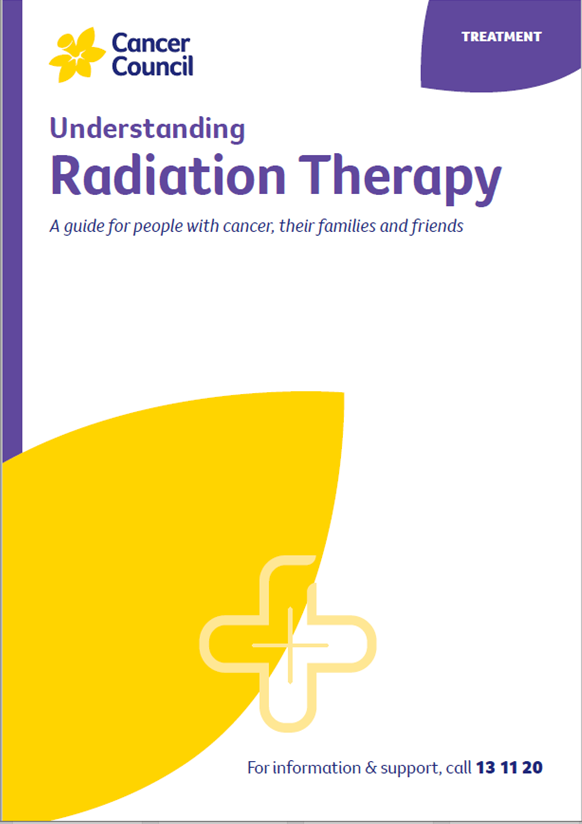- Home
- Melanoma
- Treatment for advanced melanoma
- Radiation therapy
Radiation therapy for advanced melanoma
Radiation therapy uses targeted radiation to destroy cancer cells and may help treat or manage melanoma. Learn how it works, its benefits, and possible side effects.
Learn more about:
- What is radiation therapy?
- Having radiation therapy
- Stereotactic body radiation therapy (SBRT)
- Side effects of radiation therapy
- Video: What is radiation therapy?
What is radiation therapy?
Also known as radiotherapy, radiation therapy is the use of targeted radiation to kill or damage cancer cells. Radiation therapy may be offered on its own or with other treatments. It can be used after surgery to stop melanoma coming back.
It can also be used to help relieve pain and other symptoms caused by melanoma that has spread – for example, to the brain or bone (palliative treatment).
Having radiation therapy
| Planning for radiation therapy | Before starting treatment, you will have a CT or MRI scan at a planning appointment. The radiation therapist may make some small permanent or temporary marks (tattoos) on your skin so that the same area is targeted during each treatment session. |
| Radiation therapy for the brain | If you are having radiation therapy to the brain, a plastic mask will be custom-made to fit you. It helps keep your head still so that the radiation is targeted at the same area each session. |
| Treatment schedule | Each treatment session takes about 30 minutes and is usually given daily for 1–4 weeks. |
| During the treatment | For the treatment, you will lie on a table under a machine that aims radiation at the affected part of your body. |
Stereotactic body radiation therapy (SBRT)
In some cases, you may be offered a specialised type of radiation therapy that delivers extremely precise, tightly focused beams of high-dose radiation onto the tumour from many different angles.
This is called stereotactic radiosurgery (SRS) when used on the brain, and stereotactic body radiation therapy (SBRT) when used on other parts of the body.
SBRT usually involves 3–5 treatment sessions over 1–2 weeks.
Side effects of radiation therapy
The side effects that you experience will depend on the part of the body that receives radiation therapy, the dose of radiation you receive and how long you have treatment.
Many people will have temporary side effects, which may build up over time.
Common side effects during or immediately after radiation therapy include tiredness, and the skin in the treatment area becoming red and sore.
Ask your treatment team for advice about dealing with any side effects.
Learn more about radiation therapy.
→ READ MORE: Surgery for advanced melanoma
Video: What is radiation therapy?
Watch this short video to learn more about radiation therapy.
Podcast: Treatment Options for Advanced Cancer
Listen to more of our podcast for people affected by advanced cancer
Podcast: Making Treatment Decisions
Listen now
More resources
A/Prof Rachel Roberts-Thomson, Medical Oncologist, The Queen Elizabeth Hospital, SA; A/Prof Robyn Saw, Surgical Oncologist, Melanoma Institute Australia, Royal Prince Alfred Hospital and The University of Sydney, NSW; Alison Button-Sloan, Consumer; Dr Marcus Cheng, Radiation Oncologist Registrar, Alfred Health, VIC; Prof Anne Cust, Deputy Director, The Daffodil Centre, The University of Sydney and Cancer Council NSW, Chair, National Skin Cancer Committee, Cancer Council, and faculty member, Melanoma Institute Australia; Prof David Gyorki, Surgical Oncologist, Peter MacCallum Cancer Centre, VIC; Dr Rhonda Harvey, Mohs Surgeon, Dermatologist, Green Square Dermatology, The Skin Hospital, Darlinghurst and Sydney Melanoma Diagnostic Centre, RPA, NSW; David Hoffman, Consumer; A/Prof Jeremy Hudson, Southern Cross University, James Cook University, Chair of Dermatology RACGP, Clinical Director, North Queensland Skin Cancer, QLD; Dr Damien Kee, Medical Oncologist, Austin Health and Peter MacCallum Cancer Centre and Clinical Research Fellow, Walter & Eliza Hall Institute, VIC; Angelica Miller, Melanoma Community Support Nurse, Melanoma Institute Australia, WA; Romy Pham, 13 11 20 Consultant, QLD; A/Prof Sasha Senthi, Radiation Oncologist, Alfred Health, and Clinical Research Fellow, Victorian Cancer Agency, VIC; Dr Chistoph Sinz, Dermatologist, Melanoma Institute Australia, NSW; Dr Amelia Smit, Research Fellow, Melanoma and Skin Cancer, The Daffodil Centre, The University of Sydney and Cancer Council NSW; Nicole Taylor, Clinical Nurse Consultant, Crown Princess Mary Cancer Centre, Westmead Hospital, NSW.
View the Cancer Council NSW editorial policy.
View all publications or call 13 11 20 for free printed copies.

